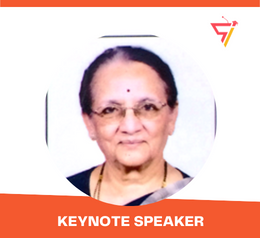Scholars International Webinar on
Advances in Drug Discovery and Development
THEME: "Recent Advances in Drug Discovery and Development "
 28-30 Mar 2022
28-30 Mar 2022  Online | Virtual
Online | Virtual THEME: "Recent Advances in Drug Discovery and Development "
 28-30 Mar 2022
28-30 Mar 2022  Online | Virtual
Online | Virtual 
Kasturba Health Society- Medical Research Centre, India
Title: Challenges in designing clinical trials for women
Dr. Joshi received a post graduate research fellowship to work on ‘Vaginal Cytology in Threatened Abortion’ which was the topic for her dissertation. She was selected as ICMR research Fellow and worked in Cama & Albless Hospitals and Wadia Maternity Hospitals. Later she pursued her clinical research interests at National Institute of the ICMR (NIRRH) on pharmacokinetics and drug interactions with hormonal steroids and drugs commonly used in India using different drug delivery systems to obtain a PhD in Biochemistry. She was awarded a WHO Post-doctoral research fellowship in Clinical Pharmacology, Liverpool, UK in 1980. She has designed, conducted and published clinical Phase 1 to 4 clinical trials related to contraceptives, treatment of women’s infections and cervical cancer chemoprevention. After her retirement from ICMR as Deputy Director, she joined Bhavan’s SPARC and subsequently continued in MRC-KHS. She has investigated the scientific therapeutic use of Ayurvedic medicinal plants in women’s health and kinetics of genistein from soya, genital infections, cervical cancer prevention, menorrhagia and menopausal health through ICMR, DBT and CCRAS research grants. She is trained in gynecologic cytology and was the first to draw attention to the relatively high prevalence of Reproductive Tract Infections (RTIs) in women attending family planning clinics, a low risk population, especially Chlamydia trachomatis infection, by using 4 different types of diagnostic tests. She has guided Mumbai University students for MSc in Life Sciences and PhD in Applied Biology. She has conducted rural clinics and surveys in Primary Health Centre, Kaman, Thane District (NIRRH, ICMR) and later in Balsad (Bhavan’s SPARC) and Bhivandi (FPAI) and established cervical cancer screening programmes for underprivileged women.She has more than 115 national and international publications to her credit including 6 chapters and citations in international text books.
Women form 50% of the world population & work force, and therefore in designing clinical trials for new drugs in any population, it is essential to pay attention to certain finer details in the protocols when women are enrolled as patients or participants in drug trials. Additionally the woman and the offspring may face major consequences if she happens to conceive during the trial of a potentially teratogenic drug. Then this concerns 100% of the population because future generations are concerned. From our experience in clinical research on hormonal and nonhormonal contraceptives, drug interactions, vaginal microbicides, antimenorrhagic drugs, menopausal syndrome, Reproductive Tract Infections (RTIs), and standardized plant extracts, we will be highlighting some of the challenges that we had to resolve during clinical trials for women. Recent literature has revealed and highlighted the differences in the drug response in men and women, the need for increasing participation of women in early clinical trials and the risks in pregnant and lactating women. We will briefly review these aspects.
In this presentation we also wish to highlight some of the neglected areas in designing the clinical trial protocols and case record forms for women. These can vitiate interpretations on safety and efficacy of Investigational Products (IPs) in women. We recommend that these should be considered in all new drug trials involving women. Individualization of therapy necessitates the consideration of timing of investigations, drugs, and surgical interventions in relation to the menstrual cycle or the physiological phase Eg. prepuberty, pregnancy, lactation, menopause.
Reasons for discontinuation from a clinical trial need to be probed with sensitivity. The importance of a good health educator and a follow up team cannot be overemphasized.